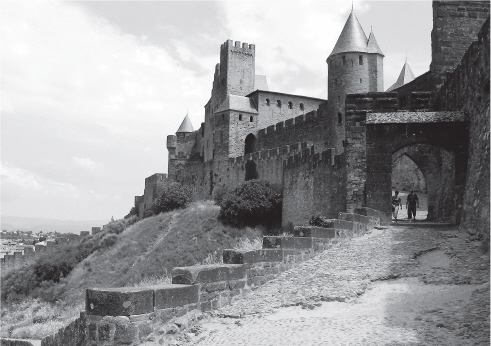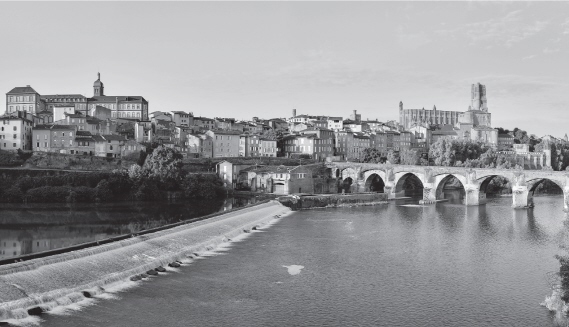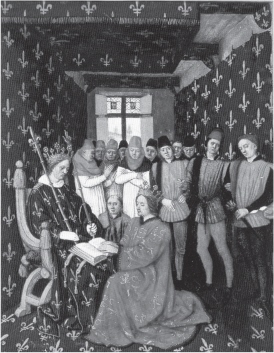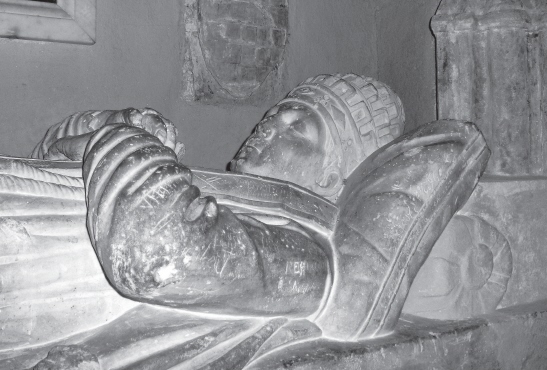The Friar of Carcassonne (31 page)
But the fourteenth-century pope could not have foreseen one last thing: it is precisely because of that same trial that the friar of Carcassonne can be remembered by us.
*
Unlike the tabula rasa of Bernard's convent in the Bourg, the place has survived from his day and can be visited. Even on the warmest days, it gives off a chill.

B
rother Bernard Délicieux was a creatureâand a victimâ of his times. As is true of all historical figures, the temptation to imagine his pertinence to the present day must be resisted, but not entirely rejected. Even in the nineteenth-century heyday of exuberant anachronism, when freethinkers and liberators were found hidden under every rock in a historical landscape stretching back to Cro-Magnon times, the story of Brother Bernard was treated with unusual care. Biographer Jean-Barthélemy Hauréau, although unable to resist viewing the Franciscan as a patriot of Languedoc independence, warned in the first major work on the Carcassonne revolt that the medieval critics of inquisition were not proceeding from a premise held by nineteenth-century democrats like himself:
It should be noted that in all the arguments put forth by the reformers there is not one word about freedom of conscience. The right to believe or not to believe, the right to reason or rant freely on any metaphysical subject, the right surrendered by some of the faithful in the early days of the Church then abolished subsequently by the decrees of Constantineâthis sentiment was lost, and many centuries would have to pass before it awoke again in the soul of man. All the complaints concerned iniquitous condemnation and scandalous expropriation. Very few people even dared question whether the inquisition was necessary; only the conduct of the inquisitor was open to accusation.
No civil libertarian, Bernard Délicieux nonetheless saw grievous wrong and summoned up the courage to try to redress it. In this he was a man for all seasonsâbut still just a man. As a hero, certainly, he fell short. The friar's feet of clay were prominently on display at his trial: the testimony clearly showed that he embraced duplicity and counseled treason in the service of his cause and that he was not above the most pusillanimous of tale-telling in his failed attempt to escape punishment at that same trial. Hardly the paragon of judicial virtue, he was no saint, either, his misrepresentations of the accord of 1299 an unedifying instance of demagoguery. Bernard was a follower of Francis, not an imitator.
This humanityâthis imperfectionâmay be what makes Brother Bernard compelling. Far more appealing than the spotless victor, the flawed vanquished presents a figure with which most people can identify, especially when the causeâstanding up to oppressionâseems universal in its nobility. Yet a note of caution has to be sounded loudly here, for however resonant the story may be in the present day, the irrevocable chasm carved by the passage of time should always be kept in mind. The writer of history attempts to bridge that chasm, but his or her construction must necessarily be flimsy, subject to collapse in the winds stirred up by new scholarship or, more likely, the new circumstances born with every generation.
Added to the fragile is the foreign: the strange people moving at a distance of several centuries, their outlook unfamiliar, alien even, like figures crossing a faraway field on a moonless night, to be distinguished only in the dimmest of half-lights. The reasoning of Bernard's judges, for example, seems reassuringly rational until a passage in their act of formal sentencing heads straight into a fog of magical thinking, its wording fit for the card catalogue at the library of Hogwarts. The passage concerns a book found in Délicieux's possession:
This little book contains many characters, the names of demons, the manner in which to conjure them, to offer sacrifices to them, to demolish through their aid houses and fortresses, to sink ships at sea, to gain the affection, the confidence and the ear of the great and others, to have women in marriage or for the act of love, to induce in people present, or even absent, blindness, broken limbs and other infirmities, even death, thanks to images and other magical acts, and in general to cause many other evils.
Not that attempting to peer into a past darkened by the march of centuries should ever be abandoned, for even from Bernard's distant day distinctly recognizable silhouettes appear. Guillaume de Nogaret is the man who will say or do anything in the service of the regime to which he owes allegiance; Jacques Fournier, the brilliant prosecutor on a mission; Pope Boniface, the leader masking, or perhaps revealing, weakness through a show of pomp; the inquisitors, men who discern an existential threat to their world order and invent, or rewrite, the rules by which they are to conduct themselves.
Of all the facets of Bernard's story, the inquisition is the one that must be approached with the greatest care, given its enduring notoriety. It is, in a sense, a celebrity of intolerance. The targets of inquisition in the years immediately after Bernard's time switched from heretics to witches, as the two categories of enemies became conflated. The inquisition also eventually became the Inquisition, a formalized institution with a permanent bureaucracy established at different times, in different countries. As with the switch from heresy to sorcery, it changed its targets according to perceived need, which is yet another figure recognizable in almost any age: an institution that alters its original mission to ensure its perennity.
In the Holy Office's most dread iteration of the early modern periodâthe Spanish Inquisitionâfirst the covert practice of Judaism and then any trace of “Jewish blood” became grounds for prosecution, as the Church undertook to erase the memory of Iberia's multiconfessional past. As with other inquisitions in the Mediterranean world, the Spanish institution also sought to punish renegadesâChristian converts to Islam captured in the piratical corsairs they sailed for the Ottomans and their allies off the Barbary Coast. Much of Catholic Europe and the Catholic New World were saddled with these tribunals until the dawn of the nineteenth century, so the well of legend runs deep and dark. So tenacious is the hold of inquisition on memory that the pope of the year 2000, John Paul II, felt compelled, in a speech decried as anachronism by some and hailed as olive branch by others, to apologize on behalf of the Church for the excesses of its inquisitors.
If the pope knew the particulars of the cause of the friar of Carcassone, his apology must also have been destined for the people of medieval Languedoc. Although modern scholarship, at a distance of so many years, has difficulty in determining from the disputed inquisition registers whether Bernard's misgivings about them were correct, the Franciscan's clerical contemporaries did not labor under the disadvantage of remoteness. The Church came to doubt the contents of Registers X and XI. They were minutely examined on several occasions by suspicious authority, which performed the historian's task, in a sense, at a time when the evidence was fresh.
Pope Boniface VIII forbade their use as grounds for prosecution; Clement V examined them personally, affixing the papal seal onto each of their pages. The most thorough of these reviews, commissioned by a pontiff, John XXII, wholly unsympathetic to the cause of Carcassonne, was conducted some eleven years after Délicieux's death by the men who had sat in judgment of him in 1319. His denunciations of the registers at the trial had planted hardy seeds of doubt in their minds. While not accepting Bernard's maximalist reading of the documents as top-to-bottom deceitful, Jacques Fournier and Raimond de Mostuéjouls concluded that they contained enough error and evidence of shoddy methods to be no longer considered accurate and trustworthy. As for the question of Guilhem Pagès and Bernard Costaâthe Good Men with the bland John Smith namesâno conclusion could be drawn as to their having existed or not. Significantly, however, no one took up the gauntlet thrown down by Bernard during the Castel Fabre matter. No one ever came forward with information about these men. Délicieux was thus vindicatedâand from the camp of his enemies emerges another familiar silhouette, the practice of lying in the pursuit of power.
Without Bernard Délicieux and his mixture of talents and flaws there would probably never have been such successful agitation against a judicial practice so perfectly in step with the persecuting ethos of its day. That in itself was his greatest accomplishmentâtaking a stand against the corruption and the cruel certainty of his times. What he did was never repeated. He was aided by his profound attachment to the Franciscan ideal, as well as his political acumen and tremendous gifts of persuasion and oratory. Yet these qualities are of limited reach, almost anecdotal, unlikely to coalesce as a distinct or universal shape. Perhaps where Bernard ultimately resides is not in the outward realm of archetype; rather, he uncomfortably touches the nerve within, where principles are housed and decisions must be made. In the end, the Agitateur du Languedoc may be pointing his finger at us all, demanding that no matter what confronts us, we be true to our convictions.

The Porte de l'Aude, the all-important gate in the fortifications of the Cité of Carcassonne that overlooked the Wall, the King's Mill, the river Aude, and the Bourg. Délicieux, Picquigny, inquisitors, the rabbleâall trod the path seen here.

The city of Albi viewed from the river Tarn. To the right, the hulking mass at the foot of the bell tower of Sainte Cécile is the notorious bishop's residence, the Palais de la Berbie.

King Philip the Fair of France receiving homage from his vassal for Aquitaine, King Edward I of England, on June 5, 1286. The pointed profusion of fleur-de-lis in Jean Fouquet's illumination can be attributed to the date of its execution (ca. 1455)â immediately after the conclusion of the Hundred Years' War. (Bibliothèque nationale de France)
